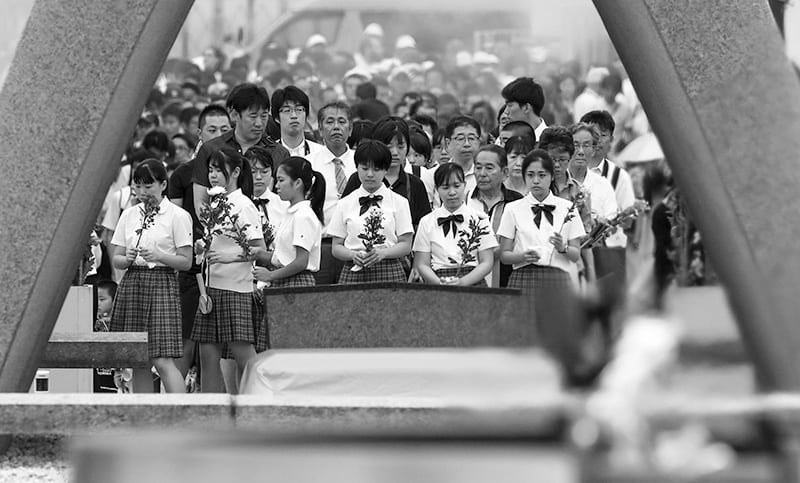
Seventy-five years ago, on Aug. 6 and 9, 1945, the United States dropped the world’s first atomic bombs on the Japanese cities of Hiroshima and Nagasaki.
The bombings provided the world its first glimpse of the devastating and deadly power of nuclear weapons. The first bomb exploded about 2,000 feet above Hiroshima at 8:15 in the morning, destroying 5 square miles of the city, and killing an estimated 200,000 people, some instantly and others later from their injuries or illnesses caused by nuclear poisoning.
From that moment on, the world has careened along two tracks, hoping and praying they would never intersect in a blinding explosion. On one side are the nations, even to this very day, that have sought to develop their own arsenal of nuclear weapons because they believe that is the only way to deter enemies. On the other side has been the fear that the human race would destroy itself by unleashing a terrifying nuclear war that would leave the planet desolate and barren.
Through it all, the Catholic Church has continued to call the world to its senses, urging nations to give up nuclear weapons and seek lasting peace through dialogue and justice.
In his 1963 encyclical “Pacem in Terris (Peace on Earth)”, St. John XXIII reminded the world, “Justice, right reason, and the recognition of man’s dignity cry out insistently for a cessation to the arms race. The stockpiles of armaments which have been built up in various countries must be reduced all round and simultaneously by the parties concerned. Nuclear weapons must be banned. … Everyone must sincerely cooperate. … But this requires that the fundamental principles upon which peace is based in today’s world be replaced by an altogether different one, namely, the realization that true and lasting peace among nations cannot consist in the possession of an equal supply of armaments but only in mutual trust.”
Nearly 60 years later, Pope Francis is proclaiming the same call for dialogue and justice. On Aug. 6, the pope sent his written message to mark the 75th anniversary of the Hiroshima bombing to Hidehiko Yuzaki, governor of the Hiroshima prefecture, who led a peace memorial ceremony on the anniversary.
“It has never been clearer that, for peace to flourish, all people need to lay down the weapons of war, and especially the most powerful and destructive of weapons: nuclear arms that can cripple and destroy whole cities, whole countries,” the pope said.
Reiterating what he said during his 2019 visits to Hiroshima and Nagasaki, Pope Francis called both the use of atomic energy for war and the possession of nuclear weapons “immoral.”
As difficult as it may seem, we Christians must continue to push for nuclear disarmament. In his address at the Peace Memorial in Hiroshima in 2019, Pope Francis warned the world of history’s harsh judgment of us if we fail in this mission. “Future generations will rise to condemn our failure if we spoke of peace but did not act to bring it about among the peoples on the earth.”
Let us pray for peace in the world and act to bring it alive in our lives and the lives of people across the globe.









